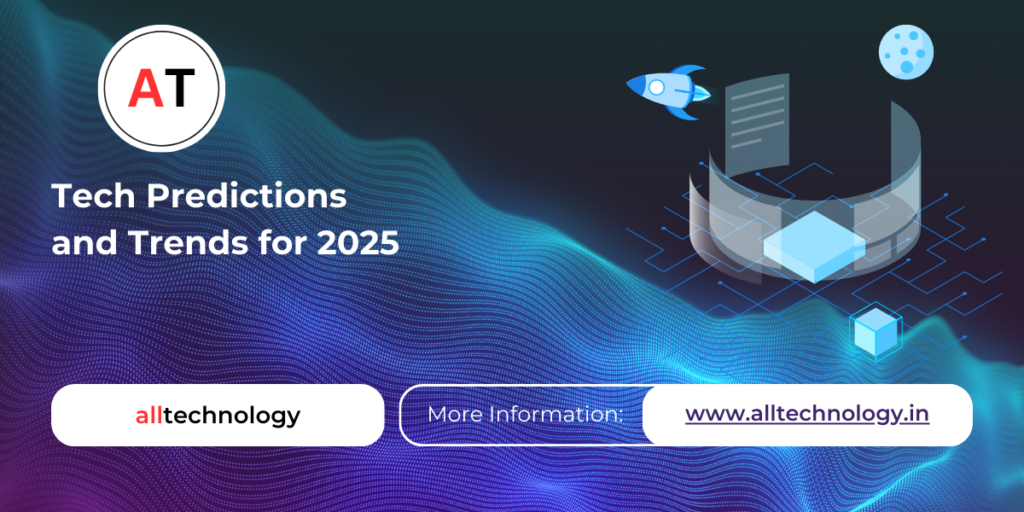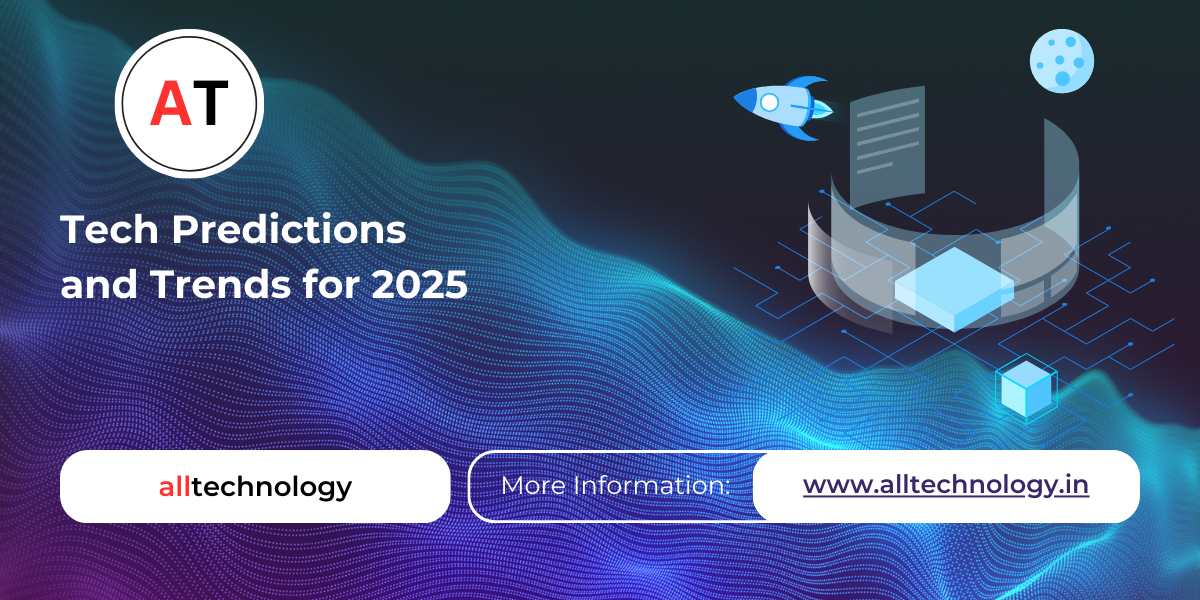Introduction
Hello Bloggers welcome alltechnology blog. In this blog you will learn Tech Predictions and Trends for 2025. As we edge closer to the halfway mark of the decade, the technological landscape is brimming with anticipation and innovation. The year 2025 promises to usher in groundbreaking advancements and trends that will redefine our interaction with technology. Here are ten captivating subheading concepts to explore the future tech predictions and trends.
Tech Predictions and Trends for 2025
Quantum Computing Breakthroughs
As 2025 dawns, the realm of quantum computing is poised to leap beyond theoretical frameworks into practical applications. Envision computers not just solving problems, but doing so with the elegance of parallel realities. These machines will unravel complexities at speeds previously deemed fantastical, outpacing classical computers by orders of magnitude. Industries from pharmaceuticals to cryptography stand on the brink of revolution. Complex molecular simulations, unachievable with current technology, will become routine. Yet, alongside this quantum leap, questions of ethical usage and cybersecurity will surge, demanding nuanced discussions and robust safeguards.

AI’s Ubiquity and Ethics
Artificial Intelligence is no longer a buzzword—it’s the bedrock of innovation. In 2025, AI will permeate every conceivable facet of life, from healthcare diagnostics predicting illnesses before symptoms appear, to personalized education systems adapting in real-time to student needs. This omnipresence of AI will prompt society to confront profound ethical dilemmas. Can we trust algorithms with decisions that impact human lives? The balance between convenience and privacy will teeter precariously, with legislative bodies racing to establish guidelines that are as dynamic as the technology they seek to regulate.
Sustainable Tech Innovations
Environmental sustainability will drive technological advancements in ways previously unseen. By 2025, expect to see the proliferation of green tech—solar panels so efficient they capture energy even in moonlight, biodegradable electronics, and smart grids that balance energy loads with pinpoint precision. Innovations such as these will not just mitigate climate change but will redefine our relationship with the environment. The transition to a circular economy will accelerate, with technology enabling the repurposing of waste into valuable resources, thus closing the loop on consumption.
The Metaverse Expansion
The metaverse will transcend its status as a virtual playground to become an integral part of daily life. Imagine virtual offices where collaboration is as seamless as in-person meetings, or social spaces where distance is irrelevant. This digital cosmos will blur the lines between reality and virtuality, fostering communities bound not by geography but by shared interests. However, this shift will bring about new challenges—identity verification, digital rights management, and the psychological impacts of spending more time in virtual environments. The infrastructure supporting this virtual universe will need to be as resilient and scalable as the world it mirrors.
Biotechnology and Human Augmentation
Biotechnology will push the boundaries of human potential. CRISPR and other gene-editing technologies will move from laboratories to clinics, offering cures for genetic disorders previously thought incurable. Human augmentation—enhancing physical and cognitive abilities through technology—will become more commonplace. Imagine neural implants that enhance memory or prosthetics that feel and function like natural limbs. These advancements will prompt deep philosophical debates about what it means to be human. The line between natural and artificial will blur, raising questions about identity, equity, and the essence of human experience.
Autonomous Everything
Automation will extend beyond factories and into every facet of daily life. Autonomous vehicles, drones delivering packages, and even household robots performing mundane tasks will become ubiquitous. The convenience of automation will be undeniable, but it will also necessitate a reevaluation of labor markets and societal structures. The displacement of jobs by machines will require new economic models and social safety nets. Moreover, the ethical programming of autonomous systems will become a critical issue—ensuring these systems operate fairly and safely within human-designed frameworks.
Top 10 Tech Predictions and Trends for 2025
1. Artificial Intelligence Everywhere
Artificial Intelligence (AI) will permeate every aspect of our daily lives, from smart homes adjusting the temperature based on our preferences to AI-driven personal assistants scheduling our meetings with an uncanny precision. The ubiquity of AI will transform mundane tasks into seamless experiences, creating an ecosystem where machines understand and anticipate human needs with an almost eerie accuracy.
2. Quantum Computing Breakthroughs
Quantum computing, once a theoretical concept confined to academic papers, is poised to break into mainstream application. Imagine solving complex problems in seconds that would take classical computers millennia. The ramifications? Profound advancements in cryptography, drug discovery, and even climate modeling, pushing the boundaries of what we consider possible.
3. 5G and Beyond: Hyper-Connectivity
The rollout of 5G networks will be the harbinger of an era marked by hyper-connectivity, where ultra-fast internet speeds and minimal latency become the norm. This shift will enable innovations such as autonomous vehicles, remote surgeries, and smart cities, where every device communicates seamlessly, creating a networked society that operates in real-time.
4. Edge Computing Revolution
Centralized data processing is gradually giving way to edge computing, where data is processed closer to its source. This paradigm shift reduces latency, enhances privacy, and enables real-time data analytics. Think of autonomous drones analyzing crop health on the fly or smart cameras that can alert authorities to suspicious activities instantaneously.
5. Immersive Reality Experiences
Virtual Reality (VR) and Augmented Reality (AR) technologies are set to redefine entertainment, education, and work. Envision immersive virtual classrooms where students interact with 3D models of historical artifacts, or AR overlays enhancing surgical precision by providing real-time data to surgeons. These experiences will blur the line between the digital and physical worlds.
6. Sustainable Technology Initiatives
As the world grapples with climate change, sustainable technology solutions will take center stage. Innovations in renewable energy, such as advanced solar cells and wind turbines, coupled with breakthroughs in energy storage, will drive a green revolution. Smart grids and IoT-enabled energy management systems will optimize consumption, heralding an era of eco-conscious living.
7. Biotechnology and Human Augmentation
Biotechnology advancements will usher in a new era of human health and capabilities. Gene editing tools like CRISPR will combat genetic diseases, while bioprinting could produce organs on demand. Meanwhile, wearable technology and neural interfaces will augment human abilities, creating a future where the line between human and machine blurs.
8. Blockchain Beyond Cryptocurrency
Blockchain technology will extend far beyond its cryptocurrency origins, transforming industries through enhanced transparency, security, and efficiency. Supply chain management, healthcare records, and even voting systems will leverage blockchain to ensure tamper-proof and verifiable transactions, fostering a trust-based digital economy.
9. Cybersecurity Evolution
As technology advances, so do the threats that accompany it. Cybersecurity will evolve to counter increasingly sophisticated attacks, utilizing AI-driven defenses that adapt in real-time. Quantum cryptography will provide unprecedented security, safeguarding sensitive data against quantum computer-based breaches, ensuring the integrity of digital infrastructures.
10. Personalized Medicine
The convergence of big data, genomics, and AI will revolutionize healthcare through personalized medicine. Treatments tailored to an individual’s genetic makeup will become commonplace, enhancing efficacy and minimizing side effects. Predictive analytics will foresee health issues before they manifest, enabling preemptive interventions and personalized wellness plans.
Conclusion
The technological landscape of 2025 will be one of profound transformation. Quantum leaps in computing, the omnipresence of AI, sustainable innovations, the expansive metaverse, groundbreaking biotechnologies, and the rise of autonomous systems will reshape the world in ways we are only beginning to fathom. As these advancements unfold, society will face unprecedented challenges and opportunities, necessitating a thoughtful balance between embracing the future and addressing the ethical, social, and practical implications of these technologies.
FAQ
Question 1. What technology is coming in 2025?
In 2025, AI will be seamlessly integrated into our daily lives, enhancing efficiency and personalization. From smart homes to predictive analytics, AI will revolutionize how we live. Q: What makes 5G connectivity a game-changer? 5G goes beyond faster internet.
Question 2. Which technology will be in demand in next 5 years?
What are the most in-demand tech jobs for the future? The demand for cybersecurity and AI roles is higher than the current supply of available professionals.
